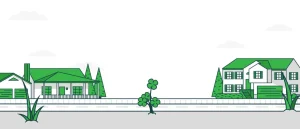There are few things more valuable than your home. Protecting your property with homeowners insurance is highly recommended for all Michiganders.
Key Takeaways:
- Average home insurance rates in Michigan rest at about $2,114 annually for a house with $300,0000 in dwelling coverage.
- On average, premiums rose about 14% in 2024.
- AAA and Frankenmuth are some of the best Michigan homeowners insurance companies.
- Those who struggle to find a policy on the standard market may be eligible for a policy with the Michigan Basic Property Insurance Association.
How Much Is Homeowners Insurance in Michigan?
The average cost of homeowners insurance in Michigan is about $2,114 per year for $300,000 of dwelling coverage. Your average rate depends on several factors and will vary by person.
For example, one of the most significant factors in determining rates is the replacement cost of your property, which determines your dwelling coverage, the largest component of homeowners insurance. Take a look at the average costs based on different levels of dwelling coverage.
| Dwelling Coverage | $200,000 | $300,00 | $400,000 |
|---|---|---|---|
|
Annual Premium |
$1,543 | $2,114 | $3,685 |
When compared with states like Florida or Alabama, cheap homeowners insurance in Michigan seems attainable. However, climate change, inflation, rising construction costs, and many other factors are fueling a nationwide homeowners insurance crisis, causing rates to rise rapidly in many states.
While the Great Lakes State surely doesn’t have the worst of it, Michigan isn’t immune to this crisis of rising premiums, with the average premium rising about 14% in 2024.While the Michigan homeowners insurance increase of 2024 may be harsh on homeowners financially, the cost of damage to your home from more frequent and severe storms will likely outweigh your rising premium costs.
Homeowners insurance protects your property from a variety of potential sources of damage, called perils. A standard home insurance policy also has liability coverages that protect your finances in case of an accident or injury around your property.
Now that we’ve gone over Michigan homeowners insurance rates, let’s see what those rates get you in terms of coverage.
Coverage A: Dwelling — Dwelling coverage is the part of your plan that financially protects the physical structure of your house. This includes your roof, walls, and windows. This also includes the essential systems of your house, like your electrical wiring and pipes.
Coverage B: Other Structures — Other structures coverage covers other permanent fixtures and features of your property that aren’t attached to your main dwelling. Pools, decks, fences, sheds, and gazebos typically fall under other structures coverage.
Coverage C: Personal Property — Personal property coverage safeguards your belongings in and around your property. This protection includes your clothes, electronics, furniture, tools, and much more. Raising your limits for this coverage can affect your home insurance rates in Michigan.
Coverage D: Loss of Use — Loss of use coverage comes into play after you suffer damage that forces you to move out of your house. While your insurance company makes repairs, they can pay for the living expenses you incur while you’re displaced, like lodging and gas, through loss of use coverage.
Coverage E: Personal Liability — Personal liability coverage in a homeowners policy protects the policyholder financially from accidents for which they’re found liable. For instance, if someone slips and falls on your property or your dog bites someone, your liability coverage can pay potential settlements and legal fees.
Coverage F: Medical Payments — Medical payments coverage is similar to liability coverage, but it’s designated for much more minor injuries. While liability limits are normally in the hundreds of thousands of dollars, your policy will only have medical payments limits of a few thousand.
These coverages are offered on standard HO-2, HO-3, and HO-5 policies in Michigan, which serve to protect traditional houses. If you’re looking for mobile home insurance in Michigan, your coverage may look a bit different. Mobile and manufactured home insurance in Michigan is often covered by a HO-7 policy.

It’s Time to Switch Your Homeowners Insurance
We partner with the nation’s top homeowners insurance companies so you can get a custom policy at an affordable price.
Homeowners Insurance Calculator for Michigan
Since this can be a lot to keep track of, let’s do an example homeowners insurance calculator for a Michigan policy.
Let’s say the replacement cost of your dwelling is $300,000. Here’s what the average house insurance in Michigan might look like for a home with $300,000 of dwelling coverage:
| Coverage Type | Amount of Coverage |
|---|---|
| Dwelling | $300,000 |
| Other Structures | $30,000 |
| Personal Property | $150,000 |
| Loss of Use | $60,000 |
| Personal Liability | $300,000 |
| Medical Payments | $3,000 |
Your dwelling coverage limit is based on the replacement cost of your home, which is what it would take to rebuild your home from scratch. It accounts for the construction, labor, and material costs. Insurers use property records and insurance inspections to determine your home’s replacement cost.
Notice that replacement cost doesn’t factor in the land itself or other real estate market factors. Thus, what you pay for your house or what you could sell your house for is not the same as its replacement cost.
On a standard Michigan home insurance quote, other structures limits are typically 10% of your dwelling coverage. So, in our example above, the other structures limit is $30,000.
Personal property coverage is much more flexible. You choose your personal property limits when you get a policy based on the value of your belongings. Insurers and agents recommend that you make a home inventory list to determine how much personal property coverage you need.
By default, a provider might recommend a limit of anywhere between 30 to 70% of your dwelling coverage limit. In our example, we went with a personal property coverage limit of 50% of dwelling coverage.
Loss of use coverage is often about 20% of your dwelling coverage. So, a $300,000 home might have $60,00 in loss of use coverage, illustrated in our example. You can increase your loss of use coverage depending on your carrier.
Personal liability limits are also very flexible. Insurers typically require that you carry at least $100,000 worth of liability coverage, but many plans default to $300,000 and go up to $1 million. If you want more liability coverage than that, you’ll need an umbrella policy.
Raising your liability limits hardly affects your monthly or yearly premiums, so most insurance companies recommend carrying more than the minimum.
Medical payments coverage usually has limits that range between a few thousand dollars. For example, you may be able to choose a medical payments coverage amount of $2,000, $3,000, or $4,000. Changing your medical payments coverage doesn’t usually affect your premium either since the dollar amount differences are relatively negligible compared to other parts of your policy.
Finding the Best Homeowners Insurance in Michigan
The best Michigan homeowners insurance will vary from person to person based on your needs and personal situation. A company with the lowest rates might not be the best option for you because it doesn’t have the coverage or endorsements you need.
Many large, national insurance companies popular around the country are also popular in Michigan, like State Farm, USAA, Farmers, and more. Additionally, on the list of insurance companies in Michigan that are reputable but relatively smaller are Cincinnati Insurance Company, headquartered in neighboring Fairfield, Ohio, and Frankenmuth Insurance, headquartered in Frankenmuth, Michigan.
To find the homeowners insurance company in Michigan that’s right for your needs, you’ll need to compare quotes from several providers. Then, you’ll be able to see who offers what you need at the best price.
Who Has the Cheapest Homeowners Insurance in Michigan?
AAA and Frankenmuth have some of the cheapest home insurance in Michigan based on our table below, while Hanover tends to have some of the most expensive. Homeowners insurance in Michigan varies quite a bit.
| Company | Average Premium |
|---|---|
|
AAA |
$1,178 |
|
Cincinnati |
$1,538 |
|
Farmers |
$1,913 |
|
Frankenmuth |
$1,265 |
|
Hanover |
$3,197 |
|
State Farm |
$1,613 |
|
USAA |
$1,474 |
Keep in mind that these are averages, and your premium could vary based on several factors about you and your home that we mentioned earlier. However, you may be able to use these averages to determine which companies tend to offer the cheapest insurance rates in Michigan.
From the data above, Frankenmuth and AAA Michigan home insurance have the lowest rates. Alternatively, companies that tend not to offer the cheapest Michigan insurance are Hanover, also known as Citizens homeowners insurance in Michigan and Farmers Insurance Group of Michigan. Large, well known insurers like USAA and State Farm homeowners insurance in Michigan offer middle-of-the road prices based on the data we collected.
There are many insurers to choose from in the Great Lakes State, far more than are represented in the table above. While you may find larger, national insurers like Liberty Mutual in Michigan, it’s worth looking into smaller, more regional insurers to see if they have offerings that better suit your needs.

It’s Time to Switch Your Homeowners Insurance
We partner with the nation’s top homeowners insurance companies so you can get a custom policy at an affordable price.
Factors Considered by Top-Rated Insurance Companies in Michigan
As we’ve discussed, many factors outside your control can influence how affordable homeowners insurance in Michigan can be. These range from environmental variables to personal considerations like credit scores and claims history. See the table below.
| Factor | Premium Effect |
|---|---|
|
Location |
Being in a flood zone, tornado-prone area, or high-crime area can raise your premiums |
|
Home Age |
Older homes tend to have more issues that can lead to claims. Thus, they often have higher premiums. |
|
Home Replacement Cost |
Larger, more expensive homes generally have higher premiums than smaller, simple houses. |
|
Home Features |
Having a wood stove, trampoline, or pool can raise your rates. Alternatively, having a home security system or deadbolt locks can lower your premiums. |
|
Policy Deductible |
Choosing a higher deductible can lower your premiums and vice versa. |
|
Claims History |
Someone who has recently filed many claims or lives at a place that generates many claims is a risk for an insurer. Carriers will charge this person higher rates as a result. |
Similarly, if you’re seeking Michigan home insurance while building your house, you may need additional coverage or a separate policy, which can come at an additional cost for the added risk during construction.
Your insurance provider will be aware if your home is in danger of these risks, and you may pay higher premiums if you are.
Flood Insurance in Michigan
They don’t call Michigan the Great Lakes state for nothing. But, with the amount of water in the state, many homeowners are at risk of flood damage, which isn’t covered by a homeowners insurance policy. Instead, homeowners will need a separate flood insurance policy to protect them against flood damage.
Michigan is separated into two distinct landmasses, and the perils you can face on each landmass are slightly different. Although you can experience damaging rain or snow anywhere in the state, the Lower Peninsula is more likely to get heavy rain, while certain areas on both the Upper and Lower Peninsulas can experience heavier lake-effect snow.
Although hurricanes aren’t a threat to the state, Michiganders often experience the remnants of major hurricanes, like 2024’s Hurricane Beryl, in the form of heavy rains that can lead to flood damage.

Stay Above Water With Flood Insurance
Do you want to pay for costly and common flood damage yourself or have an insurance policy pick up the tab?
Is Homeowners Insurance Mandatory in Michigan?
No, homeowners insurance isn’t mandatory in Michigan by law. But, if you have a mortgage, your lender will require you to get homeowners insurance because a policy protects their investment in the property. If you don’t get your own coverage, your lender can force-place insurance on you.
You can’t buy a house with a mortgage without having homeowners insurance. And, you must maintain coverage for the life of the mortgage. If you stop paying your premiums, your insurance company will drop you. Your lender will then get coverage for you called force-placed insurance.
Force-placed insurance offers worse protection at higher prices and should be avoided if you’re on the hunt for cheap home insurance in Michigan. Your lender won’t go looking for the cheapest policy when seeking out a policy for you. You don’t want force-placed insurance, so be sure to stay on top of your premiums.
Michigan Insurance Laws and Regulations
Homeowners insurance companies in Michigan have certain rules and regulations they have to follow. For instance, they need to send written communication with you in most instances regarding rate increases, cancellations, or nonrenewals. They also need to give you a certain amount of time to reply.
There are also certain rules both you and your insurance company need to abide by during the claims process. For example, your provider must tell you within 30 days of filing your claim what information they need to begin processing it. Your carrier should outline these procedures and get more specific to them in your policy.
Even the best home insurance companies in Michigan don’t have to give a policy to everyone who wants coverage. They can legally turn down someone who:
- Has been found guilty of arson or insurance fraud within the past five years
- Has had insurance canceled within the past two years due to nonpayment
- Is trying to insure a home used for illegal or dangerous purposes
- Owes two or more years of taxes on the property they want to insure
An insurer can also turn you down if your home is too risky to insure. For instance, a house in a clear state of disrepair, or a home rife with visible mold, will likely be turned down upon inspection.
Michigan Basic Property Insurance
If you can’t obtain insurance from a standard carrier, you may turn to the Michigan Basic Property Insurance Association for coverage. The state created the MBPIA to provide property insurance to people who can’t find a plan on the standard market.
Typically, if you need this type of insurance, you’ve got an extremely hard-to-insure property, or a record of fraud, arson, or other crime that deters insurers. For example, if you’re looking for rental home insurance in Michigan or modular home insurance in Michigan, this may be your best option, as these types of homes are generally risky to insure. You may also need to get Michigan basic property insurance if your provider drops you for not paying your premiums.
Note that this type of policy isn’t going to be cheap, nor will it be better than standard coverage. The state runs it, and it’s designed only to be a program of last resort if you can’t find any other coverage.
Getting the Cheapest Home and Auto Insurance in Michigan
Going with one of the best home and auto insurance companies in Michigan may be the secret to saving on your premiums. Bundling policies is one of the best ways to save money on home insurance.
Bundling insurance is a term describing when you have several policies with one insurance company, with the most common bundle being home insurance and car insurance. Bundled policies are usually easier to manage since the same provider handles all your needs. And, insurers typically offer notable discounts for trusting them with more than one policy.
Bundling discounts vary by insurer and company. But, you may save up to 20% on your premiums, equating to hundreds of dollars per year on your home and making it worthwhile to get a home and auto insurance quote in Michigan.
How to Get Homeowners Insurance Quotes in Michigan
As we mentioned earlier, you should compare more than one policy to find cheap house insurance in Michigan. Clovered makes it easy to shop around and get our unique quotes quickly.
Our proprietary quoting engine can help you compare and gather online insurance quotes for Michigan. If you need any help along the way, our team of licensed agents is on standby to help. You could also contact them right away with any questions or get a quote through them at 833-255-4117 during business hours, or you can email us at agent@clovered.com.
The editorial content on Clovered’s website is meant to be informational material and should not be considered legal advice.

 Average Home Insurance Cost in Michigan
Average Home Insurance Cost in Michigan